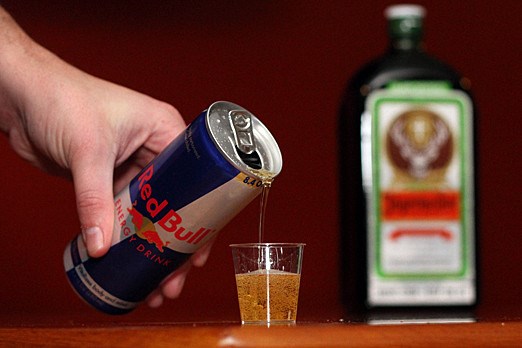Laureen Spilchuk has a tough time swallowing the idea of giving her customers a shot that combines alcohol with an energy drink.
Known as Skippy behind the bar at the Da Vinci Centre, many of Spilchuk’s patrons ask for the popular shooter Jägerbomb. But if they want to guzzle the popular bar shot, which contains a mix of Jägermeister and Red Bull energy drink, they’ll have to find another bar.
Spilchuk says she believes it’s irresponsible for bars to be selling energy drinks so customers can mix them with alcohol.
“I don’t know one bar that doesn’t sell Jägerbomb,” Spilchuk says. “Even the customers say we’re the only bar that doesn’t do it. Out of 10 people who ask for shooters, nine of them will be a Jägerbomb. When they come in, I just tell them you’re not supposed to drink it with alcohol.”
Health Canada passed new legislation on regulating energy drinks and it is currently going through a transition phase. The main issues are what the can has to say, including that it shouldn’t be mixed with alcohol.
Although Spilchuk hasn’t heard of anyone having a problem with drinking energy drinks with alcohol, She says she still doesn’t feel comfortable serving customers them.
“It’s a chance they are taking,” she says. ”You can use 7Up, you can use orange juice, there’s hundreds of shooters to make where you don’t have to use Red Bull.”
While the health implications of mixing energy drinks with alcohol has always been an issue within health circles, the potential health hazards of energy drinks alone has begun to surface more frequently as of late.
The Toronto Star reported earlier this month that the Food and Drug Administration was looking into filings relating to 13 deaths that cited that they could be possibly linked to the 5-Hour Energy drink sold in Canada.
The Star also reported the FDA acknowledged in October that it was looking into five other fatalities that mentioned the energy drink Monster Energy.
The story went on to say that 5-Hour Energy was mentioned in about 90 filings with the FDA.
More than 30 of those filings involved a serious injury such as a heart attack.
A filing with the FDA doesn’t mean that the product is responsible or contributed to a death or an injury.
Meanwhile, The Seattle Times reported in October that a student died from alcohol poisoning. That student's aunt told media that she was convinced the mixture of energy drink with the alcohol played a role in her nephew’s death.
The Department of Health also released a statement that alcohol should not be mixed with energy drinks. That statement followed in the footsteps of a lawsuit against the energy drink maker Monster. The family of a 14-year-old-boy who allegedly died after drinking two cans of the product -- without alcohol -- in two days, is suing the company.
Karling Zaporzan, a dietitian with the Thunder Bay District Health Unit, says energy drink companies in Canada now have to list where all its caffeine is coming from whether it be a natural source or artificial.
“One of the major things that happens is the caffeine actually masks the effect of alcohol in the body,” Zaporzan says.
“People don’t feel as drunk as they actually are. That often leads to this feeling of being wide-awake while drunk feeling. People then don’t see the risks as much and they are more likely to drive drunk for example.
“We see that more people have an increased risk for injury whether that is in a fight or falling. People also tend to have longer drinking episodes because they don’t feel as tired.”
Zaporzan says there’s also an increased risk for those who have underlying heart conditions.
The heart can increase its rate with physical activity, which if done naturally is good. But when the heart rate is raised by a chemical it is more dangerous for the organ.
There’s two types of beverages that commonly have energy drinks in them. Ones that are poured by either the bartender or the person doing the shot or ones that come in premixed.
She says it could get confusing because of the packaging to tell if some drinks contain caffeine and alcohol. Particularly with the handmade mixed drinks, she says it can be difficult to know exactly how much caffeine actually goes into a single shot.
She recommends people stay away from the hand-mixed drinks and be vigilant with premixed drinks.
It would be ideal to avoid the drinks altogether but she admitted that’s probably not going to happen.
